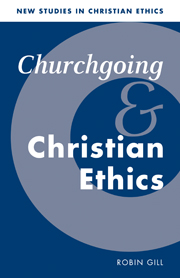Book contents
- Frontmatter
- Contents
- List of tables
- Preface
- List of abbreviations
- Introduction
- PART ONE THE THEORETICAL CONTEXT
- 1 Churchgoing and the bias of virtue ethicists
- 2 Churchgoing and the bias of sociologists
- 3 Four theories of churchgoing
- PART TWO THE EVIDENCE
- PART THREE THE IMPLICATIONS
- Postscript
- Works cited
- Index
2 - Churchgoing and the bias of sociologists
Published online by Cambridge University Press: 02 December 2009
- Frontmatter
- Contents
- List of tables
- Preface
- List of abbreviations
- Introduction
- PART ONE THE THEORETICAL CONTEXT
- 1 Churchgoing and the bias of virtue ethicists
- 2 Churchgoing and the bias of sociologists
- 3 Four theories of churchgoing
- PART TWO THE EVIDENCE
- PART THREE THE IMPLICATIONS
- Postscript
- Works cited
- Index
Summary
A curious double bias has been noted especially amongst those Christian ethicists who have been most influenced by virtue ethics. One side of the bias is to take the concept of Christian communities seriously, but the other side is to be deeply distrustful of actual Christian communities. Within Christian versions of virtue ethics, worshipping communities are seen as essential for an adequate understanding of theology and ethics. Nevertheless the frailties and inadequacies of churchgoers themselves are regarded as all too obvious. As a result, amongst a number of recent theologians a high doctrine of worship is often combined with a low estimate of worshippers.
Now it could be that this second bias has been reinforced by sociologists, who, in turn, may have unwittingly echoed a widely held popular bias. A review of literature within the sociology of religion over the last few decades does seem to confirm a widespread conviction that the beliefs and behaviour of churchgoers are little different from those of nonchurchgoers. Indeed, there has long been a sociological assumption that churchgoing lacks social significance. Whatever religious or theological significance it has, churchgoing is seldom thought to be an activity that has an appreciable effect upon moral/social attitudes or behaviour. In contrast to age, social class or gender, churchgoing is basically a dependent rather than an independent social variable. Moreover, since churchgoers are predominantly elderly, middle class and female, differences between them and nonchurchgoers are typically regarded as attributable to these variables rather than to their regularity of churchgoing.
- Type
- Chapter
- Information
- Churchgoing and Christian Ethics , pp. 31 - 58Publisher: Cambridge University PressPrint publication year: 1999



